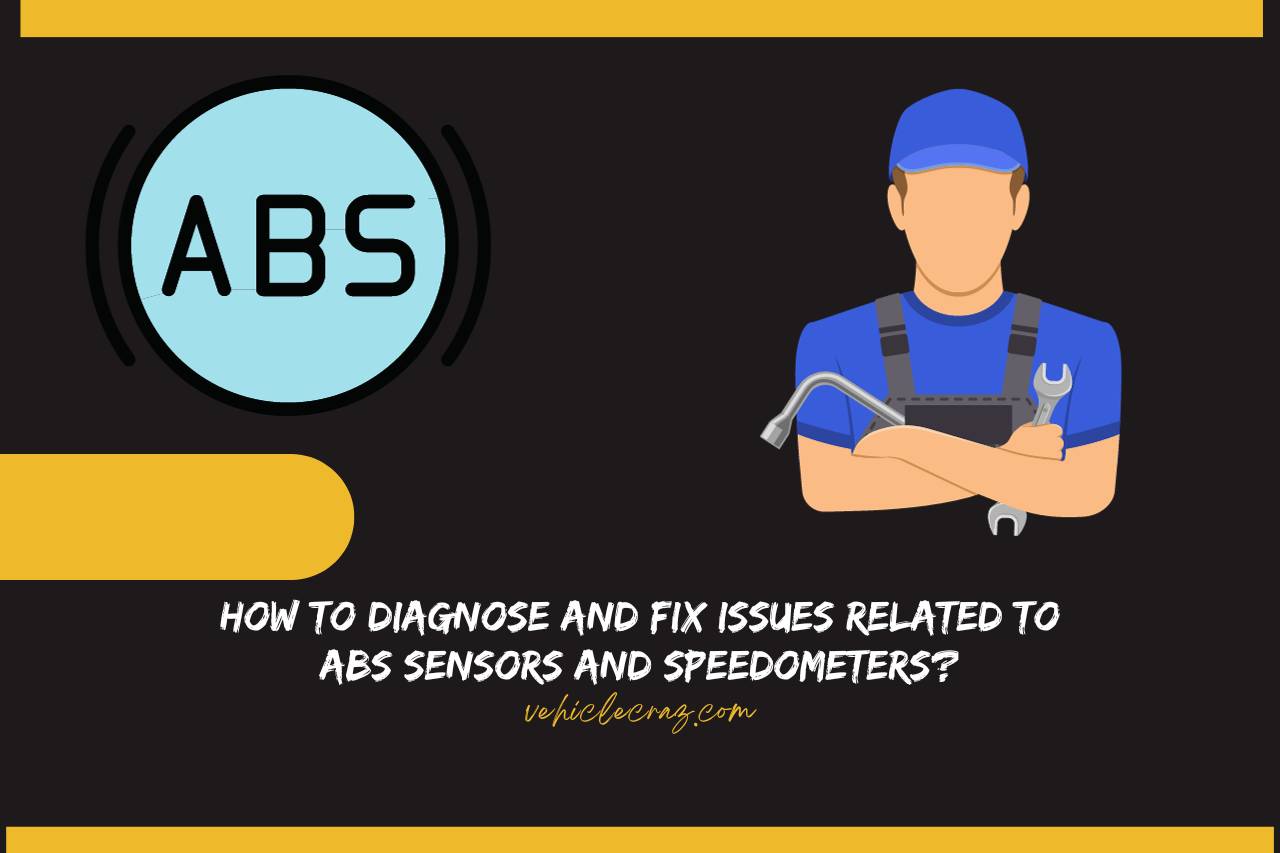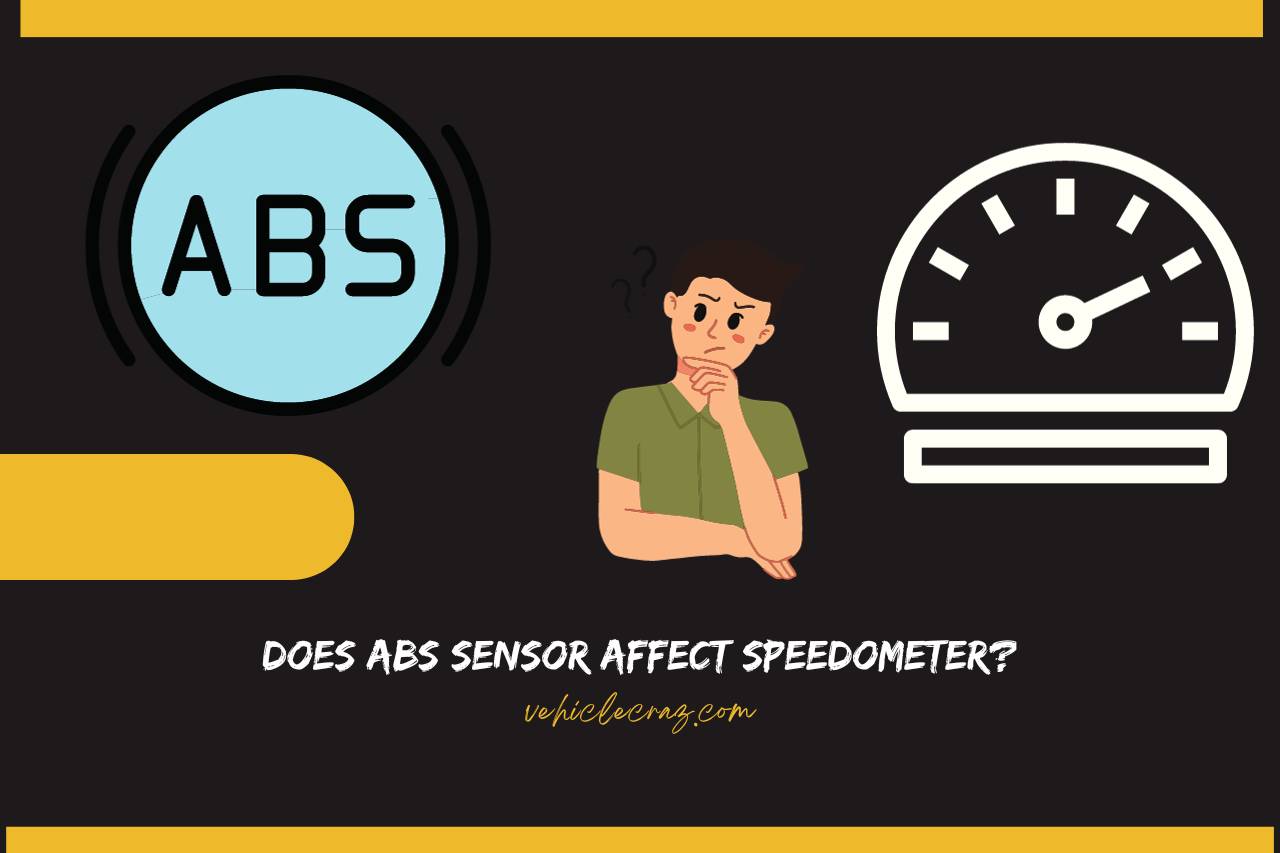Does ABS Sensor Affect Speedometer? [Fixes Included]
Does ABS sensor affect speedometer? This common question arises when you face erratic speedometer readings or ABS warning lights. This article discusses the intricate relationship between ABS sensors and speedometers. Let’s get started.
Does ABS Sensor Affect Speedometer Readings?
The ABS sensor, while primarily designed for anti-lock braking systems, can indirectly impact speedometer readings in some vehicle models.
In most modern vehicles, the speedometer gets its data from the vehicle’s transmission system.
However, in certain cases, the ABS sensor, which monitors the wheel speed to prevent brakes from locking up, can also play a part in speedometer functionality.
In vehicles where the speedometer is partially or entirely dependent on the ABS system for speed data, a malfunctioning ABS sensor can lead to inaccurate speedometer readings.
This happens because if the ABS sensor is not correctly measuring the wheel speed, it may relay erroneous data to the speedometer, causing it to display incorrect speeds.
However, it’s important for you to note that this is not universal across all vehicle makes and models.
In many vehicles, ABS and speedometer systems are separate, and the ABS sensor has no direct effect on the speedometer.
In such cases, speedometer inaccuracies are more likely to be caused by issues within the transmission system or the speedometer itself.
Understanding whether your vehicle’s speedometer relies on the ABS sensor for data is crucial for accurate diagnostics and repair.
If you suspect the ABS sensor is affecting the speedometer, consulting the vehicle’s manual or a professional mechanic can provide clarity and direction for repairs.
How Do ABS Sensors Work and How Are They Linked to Speedometers?
ABS sensors function by monitoring wheel speed and play a pivotal role in certain vehicle speedometer systems. Located at each wheel, these sensors are integral to the Anti-lock Braking System (ABS), ensuring safe braking under various conditions.
The working principle of ABS sensors is based on detecting wheel speed. Each sensor consists of a toothed wheel and a magnetic coil. As the wheel rotates, the teeth pass by the coil, creating a magnetic field that generates electrical pulses. The frequency of these pulses corresponds to the wheel’s speed.
The ABS control unit processes this information to modulate brake pressure, preventing wheel lock-up during sudden stops. In some modern vehicles, ABS sensors play a role beyond the braking system. These vehicles use speed data from ABS sensors for their speedometer readings. This integration can be more efficient, eliminating the need for separate speed sensing in the transmission.
However, if an ABS sensor malfunctions, it can directly affect the speedometer, leading to inaccurate readings. Vehicle owners must be aware of their specific vehicle’s design — whether the speedometer is linked to ABS sensors or operates independently — for accurate diagnostics and maintenance.


How to Fix Issues Related to ABS Sensors and Speedometers?
If a vehicle uses ABS sensor data for the speedometer, ensuring these sensors are functioning correctly is crucial for accurate speed readings. Here is what you need to do.
Diagnostic Tool Scan
Begin by using an OBD-II (On-Board Diagnostics) scanner. This tool can read ABS-related error codes from the vehicle’s computer system, indicating whether the ABS sensor is malfunctioning.
Visual Inspection of ABS Sensors
Check each ABS sensor for physical damage, dirt, or debris that might obstruct operation. Ensure sensors are securely attached, and wiring is intact.
Testing ABS Sensor Output
Using a multimeter, test the ABS sensor’s output while the wheel is spinning. A consistent and stable output usually indicates a healthy sensor, while erratic or no output can signal a problem.
Speedometer Test Drive
After ensuring ABS sensors are functioning correctly, conduct a test drive. Compare the vehicle’s speedometer readings with a GPS-based speed app to verify accuracy.
Professional Assistance
If the issue persists despite efforts, it’s advisable to seek professional help. A qualified mechanic can perform a more detailed diagnosis, especially if the problem lies deeper within the vehicle’s electrical system or the speedometer itself.
Regular maintenance of ABS sensors, including cleaning and timely replacement, can prevent many speedometer related issues. By following these diagnostic and repair steps, drivers can ensure the accuracy of their speedometers and the proper functioning of the vehicle’s ABS system.
You May Also Like
- Does Speedometer Measure Average Speed? Exploring Speedometer!
- Can you Add a Digital Speedometer to a Car? (Step-by-Step)
- How to Remove Scratches from Speedometer Lens? Practical How-To!
- Which Fuse Controls the Speedometer? Start with the Fuse Box!
- How to Calibrate a Speedometer? From Novice to Pro!
- How to Tell If My Car Speedometer is Accurate? Tips to Test!
- Speedometer Not Working – Troubleshooting Your Car!
- Why is My Speedometer Jumping? Solving the Mystery!
- Does Tire Size Affect Speedometer? Expert Insights!


I’m Alex, a seasoned mechanical teacher with over 20 years of hands-on experience in Australia. My passion for all things automotive has driven me to establish this blog, aiming to share my wealth of knowledge and expertise with fellow enthusiasts, DIYers, and anyone keen on understanding the mechanics behind the machines we rely on daily.





![Can you Add a Digital Speedometer to a Car? [New/Older Vehicles]](https://vehiclecraz.com/wp-content/uploads/2023/11/ElecdiaryPresspallettevehiclecraz-49-768x512.jpg)
![Does Tire Size Affect Speedometer? [Myths Busted]](https://vehiclecraz.com/wp-content/uploads/2023/11/ElecdiaryPresspallettevehiclecraz-33-768x512.jpg)
